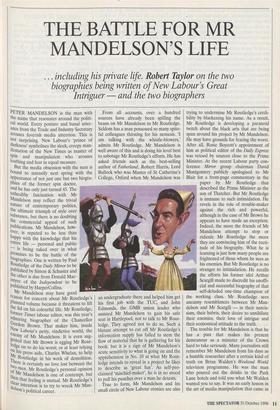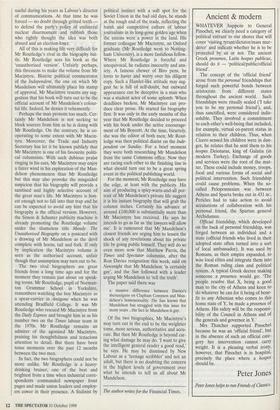THE BATTLE FOR MR MANDELSON'S LIFE
. . . including his private life. Robert Taylor on the two
biographies being written of New Labour's Great Intriguer — and the two biographers
PETER MANDELSON is the man with the name that resonates around the politi- cal world. Every posture and banal utter- ance from the Trade and Industry Secretary arouses feverish media attention. This is not surprising. New Labour's 'prince of darkness' symbolises the sleek, creepy man- ifestation of the New Times as master of spin and manipulation who arouses loathing and fear in equal measure. But the media obsession with the man is bound to intensify next spring with the appearance of not just one but two biogra- phies of the former spin doctor, and he has only just turned 45. The unhealthy fascination with Mr Mandelson may reflect the trivial nature of contemporary politics, the ultimate triumph of style over substance, but there is no doubting the commercial appeal of such publications. Mr Mandelson, how- ever, is reputed to be less than happy with the knowledge that his entire life — personal and public is being raked over in what Promises to be the battle of the tlographies. One is written by Paul Routledge of the Daily Mirror to be Published by Simon & Schuster and the other is due from Donald Mac- intYre of the Independent to be Published by HarperCollins. Mr Mandelson may have good reason for concern about Mr Routledge's Planned volume because it threatens to lift the lid on his colourful life. Mr Routledge, former Times labour editor, was this year's admiring biographer of the Chancellor ,,,Gordon Brown. That makes him, inside New Labour's petty, vindictive world, the enemy of Mr Mandelson. It is even sug- gested that Mr Brown is egging Mr Rout- 'edge on to do his worst; or at least relying 1°,11 his press aide, Charles Whelan, to help Routledge in his work of demolition. ,"'ere is certainly no love lost between the "vn men. Mr Routledge's personal opinion f Mr Mandelson is one of contempt, but ..`11, en that feeling is mutual. Mr Routledge's 'lea" intention is to try to wreck Mr Man- delson's political career. From all accounts, over a hundred sources have already been spilling the beans on Mr Mandelson to Mr Routledge. Seldom has a man possessed so many spite- ful colleagues thirsting for his nemesis. 'I am talking with the whistle-blowers,' admits Mr Routledge. Mr Mandelson is well aware of this and is doing his level best to sabotage Mr Routledge's efforts. He has asked friends such as the best-selling author of Fatherland, Robert Harris, Lord Bullock who was Master of St Catherine's College, Oxford when Mr Mandelson was an undergraduate there and helped him get his first job with the TUC, and John Edmonds, the GMB union leader who assisted Mr Mandelson to gain his safe seat in Hartlepool, not to talk to Mr Rout- ledge. They agreed not to do so. Such a blatant attempt to cut off Mr Routledge's information supply has failed to stem the flow of material that he is gathering for his book; but it is a sign of Mr Mandelson's acute sensitivity to what is going on and the apprehension in No. 10 at what Mr Rout- ledge intends to reveal in a project he likes to describe as 'great fun'. As self-pro- claimed 'mischief-maker', he is in no mood to pull his punches over a man he detests. True to form, Mr Mandelson and his small circle of New Labour cronies are also The trouble for Mr Mandelson is that he has a past that makes his present demeanour as a minister of the Crown hard to take seriously. Many journalists still remember Mr Mandelson from his days as a humble researcher after a certain kind of truth on Brian Walden's Weekend World television programme. He was the man who poured out the drinks in the Park Lane hotels and told you what Mr Walden wanted you to say. It was an early lesson in the art of media manipulation that came in useful during his years as Labour's director of communications. At that time he was forced — no doubt through gritted teeth to defend the party's policy of unilateral nuclear disarmament and rubbish those who rightly thought the idea was both absurd and an election-loser.
All of this is making life very difficult for Mr Routledge's rival in the biography bat- tle. Mr Routledge sees his book as the `unauthorised version'. Unfairly perhaps, this threatens to make the volume from Mr Macintyre, Blairite political commentator of the Independent, the one on which Mr Mandelson will ultimately place his stamp of approval. Mr Macintyre resents any sug- gestion that his book will turn out to be the official account of Mr Mandelson's colour- ful life. Indeed, he denies it vehemently.
Perhaps the man protests too much. Cer- tainly Mr Mandelson is not seeking to block sources from him as he is doing with Mr Routledge. On the contrary, he is co- operating to some extent with Mr Macin- tyre. Moreover, the Trade and Industry Secretary has let it be known publicly that Mr Macintyre is one of his favourite politi- cal columnists. With such dubious praise ringing in his ears, Mr Macintyre may enjoy a fairer wind in his exploration of the Man- delson phenomenon than Mr Routledge but this may also provoke the misguided suspicion that his biography will provide a sanitised and highly selective account of the great man's life. Mr Macintyre is hon- est enough not to fall into that trap and he can be expected to avoid any hint that his biography is the official version. However, the Simon & Schuster publicity machine is already promoting the Routledge volume under the shameless title Mandy: The Unauthorised Biography on a postcard with a drawing of Mr Mandelson as the devil complete with horns, tail and fork. If only by implication the Macintyre volume is seen as the authorised account, unfair though that assumption may turn out to be.
The two rival biographers are great friends from a long time ago and for the moment they remain just about on speak- ing terms. Mr Routledge, pupil of Norman- ton Grammar School in Yorkshire, remembers watching the boy Macintyre as a spear-carrier in Antigone when he was attending Bradfield College. It was Mr Routledge who rescued Mr Macintyre from the Daily Express and brought him in as his number two on the Times labour team in the 1970s. Mr Routledge remains an admirer of the agonised Mr Macintyre, praising his thoughtfulness and tenacious attention to detail. But there have been tense moments over the past 12 months between the two men.
In fact, the two biographers could not be more unlike. Mr Routledge is a heavy- drinking bruiser, one of the best and brightest from a time when industrial corre- spondents commanded newspaper front pages and made union leaders and employ- ers cower in their presence. A Stalinist by political instinct with a soft spot for the Soviet Union in the bad old days, he stands at the rough end of the trade, reflecting the harsh and competitive culture of labour journalism in its long-gone golden age when the unions were a power in the land. His former colleague Mr Macintyre, an Oxford graduate (Mr Routledge went to Notting- ham University), is a more fastidious fellow. Where Mr Routledge is forceful and unequivocal, he radiates insecurity and anx- iety. A famous chewer of Biro pens, he loves to haver and worry over his diligent copy. Such a Hamlet-like attitude may sug- gest he is full of self-doubt, but outward appearance can be deceptive in a man who was a student actor of some aplomb. When deadlines beckon, Mr Macintyre can pro- duce clear prose. He started his biography first. It was only in the early months of this year that Mr Routledge decided to proceed with his book under the active encourage- ment of Ms Boycott. At the time, bizarrely, she was the editor of both men; Mr Rout- ledge was then political diarist on the Inde- pendent on Sunday. For a brief moment they were both researching Mr Mandelson from the same Commons office. Now they are racing each other to the finishing line in what should turn out to be a great spring event in the political publishing world.
For the moment, Mr Routledge may have the edge, at least with the publicity. His aim of producing a spicy-warts-and-all por- trait of Mr Mandelson's private life suggest it is his instant biography that will grab the column inches. Certainly his advance at around £100,000 is substantially more than Mr Macintyre has received. He says he intends to go as far as 'the lawyers will allow me'. It is rumoured that Mr Mandelson's closest friends are urging him to lessen the shock of any revelations about his private life by going public himself. They will do so even more now that Matthew Parris, the Times and Spectator columnist, after the Ron Davies resignation this week, said on Newsnight that Mr Mandelson 'is certainly gay', and the Sun followed with a leader urging Mr Mandelson to 'tell the truth'.
The paper said there was
a massive difference between Davies's shenanigans on Clapham Common and Man- delson's homosexuality. The Sun knows that Mandelson has struggled with this issue for many years ...the fact is: Mandelson is gay.
Of the two biographies, Mr Macintyre's may turn out in the end to be the weightier tome, more serious, authoritative and accu- rate. But then Mr Routledge is beyond car- ing what damage he may do. 'I want to give the intelligent general reader a good read,' he says. He may be dismissed by New Labour as a 'teenage scribbler' and not an adult, but there is no doubting the concern in the highest levels of government over what he intends to tell us all about Mr Mandelson.
The author writes for the Financial Times.



















































































 Previous page
Previous page